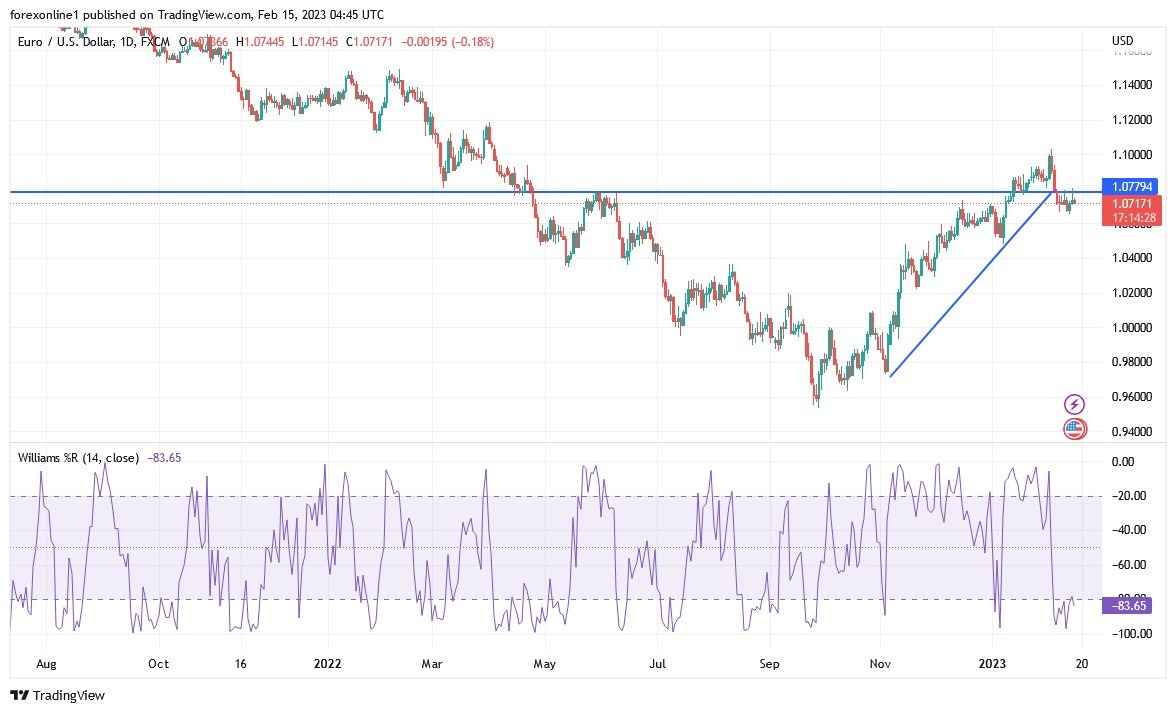The EUR/USD exchange rate witnessed a volatile response to the official figures that revealed rapid increases in American prices for some goods and services that put a question mark on how long the recently announced inflation reduction process in the United States can be expected to continue.
The price of the euro against the dollar EUR/USD fell to the support level of 1.0714 at the time of writing the analysis. This was after an attempt to bounce back with gains towards the resistance level of 1.0804 before the announcement of the American inflation figures.
According to the official announcement, the US consumer price index fell less than expected in January when the pace of overall price growth came in at 6.4%, down from 6.5% previously but higher than the consensus estimate of 6.2%, while the core inflation rate fell by 10 points Foundation only. at a 5.6% point. The latter was expected to drop to 5.5% but remained elevated by accelerating price growth for some goods and services including clothing and transport services, leaving the disinflation process recently enacted by some Federal Reserve rate-setters hanging in the balance. In this regard, says Neil Pearl, chief investment officer at Premier Miton Investors. "The changes in the methodology for calculating the consumer price index will have some effect on the published number, but it does not hide the fact that the annual numbers do not look good. Core inflation is higher than expected." And "perhaps we witnessed a pause in the improvement we were hoping for. The outlook is still clouded by uncertainty about inflation and the resulting policy actions. All of this may have been priced in in the short term, but it should be the long term concern."
Yesterday's data comes after US Federal Reserve Chairman Jerome Powell and others said with cautious optimism in February that the previous declines in inflation are likely to be the beginning of a deflationary process that will eventually lead to inflation returning to the 2% target if the right policy actions are followed. But US Federal Reserve Governor Powell and several other members of the Federal Open Market Committee (FOMC) repeatedly reminded in December and early January that previous cases of deflation were eventually followed by a new recovery and warned that the same could happen again. While it's still early days and deflation may reassert itself, Tuesday's data leaves much to be desired on the February US inflation report, which could have important implications when it comes to interest rate expectations.
Federal funds rate futures were adjusted yesterday to indicate that borrowing costs are almost certain to rise to a range of 5% to 5.25% later this year. This is so far assumed to be the likely peak for interest rates in the United States, but the danger is that the February data reveals more negative developments in domestic price trends and leads members of the Federal Open Market Committee (FOMC) to raise expectations about how higher rates may need to be raised. Eventually to rise in the coming months. And for his part, Knut Magnussen, chief economist at DNB Markets, says: "Our view remains that inflation will continue to slow down in the coming months." He adds: "However, the expected slowdown in services may take somewhat longer as the labor market remains very tight.
The January reading supports our view regarding two additional increases of 25 basis points in the months of March and May."
Technical analysis of the euro dollar EUR/USD
- In the near term and according to the performance on the hourly chart, it seems that the EUR / USD currency pair is about to resume the formation of the ascending channel.
- This indicates the bulls' attempt to regain control of the currency pair.
- Therefore, they will target extended gains at around 1.0751 or higher at the 1.0770 resistance.
- On the other hand, the bearish speculators will target potential downside profits at around 1.0715 or below at the 1.0694 support.
In the long term and according to the performance on the daily chart, it seems that the EUR/USD currency pair is trading within the formation of a descending channel. This indicates a significant long-term bearish bias in market sentiment. Therefore, the bearish speculators will look to extend the current wave of declines towards 1.0596 or below to the 1.0460 support. On the other hand, the bulls will look to pounce on profits at around 1.0846 or higher at the 1.0987 resistance.
Ready to trade our daily Forex analysis? We’ve made a list of the top ten Forex brokers worth trading with.


